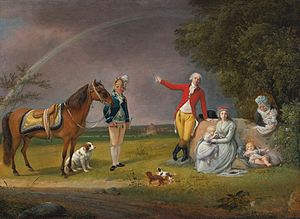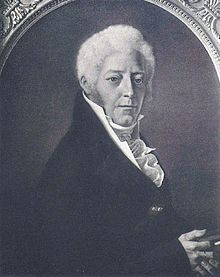Alexander Mikhailovich Beloselsky
Alexander Michailowitsch Beloselski , also Belosselski-Beloserski ( Russian Александр Михайлович Белосельский-Белозерский ) (* 1752 in Saint Petersburg ; † December 26, 1809 in Saint Petersburg) was a Russian prince and diplomat, diplomat.
Life
origin

Alexander Belosselski was the son of Vice Admiral Michail Andrejewitsch Belosselski (1702–1755) and his second wife Natalja Grigoryevna Tschernyschowa (1711–1760).
Career
He grew up in London under the supervision of a maternal uncle, Naval Admiral Count Ivan Grigoryevich Chernyshev . He later went to Berlin , where he received private lessons from Dieudonné Thiébault , professor and secretary of Frederick II . He completed several years of military training as a cavalryman in a Russian elite regiment, the Ismailovsky Life Guard Regiment . From 1775 to 1778 he traveled to France and Italy , and in 1779 he was sent to the Electoral Saxon court in Dresden to succeed his deceased brother Andrej with the rank of chamberlain as the Imperial Russian envoy . From 1789 to 1793 he was envoy to the royal Sardinian court in Turin . After that he lived in Russia again. On the Fontanka , a left branch of the Neva in Saint Petersburg , the palace of the Belosselski-Belozersky family was built in 1797 .
Belosselski corresponded with Voltaire , Beaumarchais , Marmontel and Goethe , among others . The philosopher Immanuel Kant , although known as a cautious letter writer, exchanged letters with Belosselsky in the summer of 1792. There Kant addressed the faculty of thought and wrote about the faculty of judgment that it was the faculty of proving one's intellect in concrete terms . Belosselski had previously sent his work La Dianyologie ou tableau philosophique de l'entendement from Dresden in 1790 to Kant in Königsberg . Belosselski himself divided judgment (l'intelligence universelle) into different subcategories ( spheres ).
family
Belosselski was married to Varvara Jakowlewna Tatishcheva (1764–1792) in his first marriage since 1786. The children Maria (1787-1857), Natalja (1788-1813), Sinaida (1789-1862), who was born in Dresden, and Ippolit (1790-1792) came from this connection.
His second wife since 1795 was Anna Grigoryevna Kosizkaja (1773-1846). The couple had three children: Esper (1802–1846), Jekaterina (1804–1861) and Jelisaveta (1805–1824).
Works (selection)
- De la musique en Italie. 1778.
- Poésies françaises d'un prince étranger. 1789.
- Dianyologie ou tableau philosophique de l'entendement (Дианиология или Философская картина интеллекта). 1790.
- Olinka or First Love (Олинька или первоначальная любовь). 1796. (Libretto for the Opéra comique of the same name )
literature
- Arsenij Vladimirovich Gulyga: Immanuel Kant. Springer Science & Business Media, New York 1987, ISBN 1-4684-0542-X .
- Albert Mitchell: The Concept of Religious Passion: According to Immanuel Kant. Xlibris Corporation, 2013, ISBN 978-1-4836-7692-0 , pp. 218 f.
Web links
- Alexander Belosselsky and his family
- Princely family Belosselski-Belozerski (Russian)
- Portrait of Alexander Belosselski (copper engraving by Christian Gottfried Schultze )
- Beloselsky Belozersky Palace in St. Petersburg
Individual evidence
- ^ Father Mikhail Belosselsky
- ↑ Biography of Alexander Belosselski
- ↑ Marina Ritzarev: Eighteenth-century Russian Music . Ashgate 2006, pp. 134/135, ISBN 978-0-7546-3466-9
- ↑ Udo Kern: What is and what should be: Nature and freedom in Immanuel Kant. Walter de Gruyter, Berlin 2007, ISBN 978-3-11-019226-1 , p. 127.
- ^ Arnulf Zweig (Ed.): Correspondence. Immanuel Kant. Cambridge University Press, Cambridge / New York 1999, ISBN 0-521-35401-3 , p. 419.
- ^ Marie-Élise Zovko, Jure Zovko: The Metaphysical Character of Philosophy. Institute of Philosophy, Zagreb, University of Zadar, Croatia, In: Mark Pestana (Ed.): Metaphysics. 2012, ISBN 978-953-510-646-3 , p. 25.
- ^ Maria Fairweather: Pilgrim Princess A Life of Princess Zinaida Volkonsky. Carroll & Graf Pub., 1999, ISBN 0-7867-0831-X , Chapter one: Childhood: Her Father's Daughter.
| personal data | |
|---|---|
| SURNAME | Beloselsky, Alexander Mikhailovich |
| ALTERNATIVE NAMES | Beloselsky-Belozersky, Aleksander Mikhailovich; Белосельский-Белозерский, Александр Михайлович (Russian) |
| BRIEF DESCRIPTION | Russian diplomat and scout |
| DATE OF BIRTH | 1752 |
| PLACE OF BIRTH | St. Petersburg |
| DATE OF DEATH | December 26, 1809 |
| Place of death | St. Petersburg |


